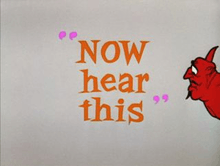Now Hear This (film)
| Now Hear This | |
|---|---|
| Looney Tunes series | |
 The opening of the title sequence, with Satan wondering where his other horn went. | |
| Directed by |
Chuck Jones Maurice Noble (co-director) |
| Produced by | David H. DePatie |
| Story by |
John Dunn Chuck Jones |
| Music by |
Bill Lava (music) Treg Brown (sound effects) |
| Animation by |
Ben Washam Bob Bransford |
| Layouts by | Maurice Noble |
| Backgrounds by | Philip DeGuard |
| Studio | Warner Bros. Cartoons |
| Distributed by | Warner Bros. Pictures |
| Release date(s) | April 27, 1963 |
| Color process | Technicolor |
| Running time | 6 minutes |
| Country | United States |
| Language | English |
Now Hear This is a 1962 animated short film in the Looney Tunes series produced by Warner Bros. Cartoons, Inc. It was directed by Chuck Jones and Maurice Noble, and written by Jones and John Dunn. The title comes from a phrase used aboard American naval ships as an instruction to cease activity and listen to the announcement that will follow. The phrase was referred into another WB cartoon, Now Hare This, five years before this one.
This cartoon is notable in that it has no rings at the opening title sequence (see "Title Sequence" below). In addition, this cartoon is notable for resembling a UPA cartoon (whose cartoons had used limited animation techniques) more than a typical Warner Bros. short of the time.
Plot
Satan, the Head Devil, loses his left horn, which is found by an elderly man in Britain (there are clues to the cartoon's location; the bin says "Keep Britain Tidy" and Rule Britannia is heard twice) who uses it as a hearing trumpet. Soon the man experiences a series of aural and visual hallucinations: A bug sounds like a locomotive; a butterfly causes him to see strange patterns; a short man in a pink suit makes mischief, at one point pulling a telephone from the horn and turning the phone's mouthpiece into a shower outlet. These hallucinations become steadily more strange and frightening before finally culminating in a "GIGANTIC EXPLOSION!" Having suffered enough, the gentleman leaves the horn behind in favor of his original hearing trumpet, which he had thrown out at the cartoon's beginning. After he leaves, Satan materializes and is glad to find his missing horn; he screws it back on and disappears. The cartoon ends with the moral: "The other fellow's trumpet always looks greener".
Title sequence
That was the first Warner Bros. cartoon short to use the "modern" abstract opening and closing sequences, which would be used on all mid-1960s WB shorts, mainly produced by DePatie-Freleng Enterprises and Warner Bros.-Seven Arts Animation. This is also one of the rare Looney Tunes shorts to list the director's name first.
At the close of the cartoon, when the "modern" close is in progress, they have the first four notes of the Westminster Quarters play to bring on the four elements of the "WB" lettering, then as the words "A Warner Bros. CartOOn" scroll appear, Big Ben chimes, and then as the OO's in Cartoon separate from the words, a bicycle horn is heard squeaking three times. Big Ben gives one more chime as the words finish appearing on the screen before the fadeout. This closing sequence is seen in two more cartoons: Bartholomew Versus the Wheel and Señorella and the Glass Huarache. An updated variant was used on DFE-produced cartoons until the W7 era, except instead of Big Ben's chimes and the honks, a reprise of Bill Lava's version of the "The Merry-Go-Round Broke Down" is heard, and (with the exception of Pancho's Hideaway) instead of the background being white, the background is black.
The sequence was the idea of Chuck Jones; however, he was fired before he moved on to MGM Animation/Visual Arts due to participating in an animated production by United Productions of America, Gay Purr-ee (the film was later picked up by Warner for distribution), and he couldn't direct any more cartoons with this opening.
Availability
- Now Hear This is available on Warner Bros. Home Entertainment Academy Awards Animation Collection, Disc 3, on Looney Tunes Golden Collection: Volume 6, Disc 4 and on Warner Bros. Home Entertainment Academy Award-Nominated Animation: Golden Gems.